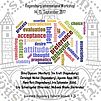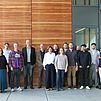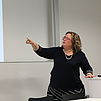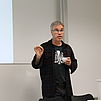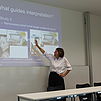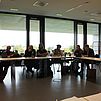
Wird geladen...
Attitudes in Context
September 14 - 15, 2017
“Attitudes in Context” is an interdisciplinary workshop with philosophers and psychologists on recent developments and problems in the theory of attitudes. Philosophical debates on the nature of attitudes – triggered by phenomena of behavioral inconsistency – have received novel input from psychological methods of measuring attitudes. In turn, the debate on techniques of measuring attitudes in psychology has led to discussions of foundational issues in attitude theory. This workshop creates a shared floor for discussion.
Zeitplan
Program
SEPT 14- 13:30 Coffee and Welcome |
- 14:00 Shira Elqayam (De Montfort) |
| "Deontic attitudes: Norm generation, moral judgement and grounded rationality" |
- 15:20 Eric Schwitzgebel (Riverside) |
| "The Pragmatic Metaphysics of Belief" |
- 16:40 Hans Rott (Regensburg) |
| "Beliefs, doxastic preferences and context effects" |
SEPT 15- 10:00 Michaela Wänke (Mannheim) |
| "Pragmatic Persuasion" |
- 11:20 Iris Schneider (Köln) |
| "The Route of Doubt: Using Mouse Trajectories to examine Attitudinal Ambivalence" |
- 14:00 Agustín Rayo (MIT) |
| "Belief-attributions for fragmented believers" |
-15:20 Tim Kraft (Regensburg) |
| "Belief and Acceptance" |
-16:40 Christoph Michel (Regensburg) |
| "Problems for static conceptions of attitudes" |
(Each talk will be followed by a 10 minutes break) |
HÖRSAAL H26
VIELBERTH-GEBÄUDE
UNIVERSITÄT REGENSBURG
UNIVERSITÄTSSTRASS
93053 REGENSBURG
SPONSOR: UNIVERSITÄTSSTIFTUNG HANS VIELBERTH
Abstracts
Shira Elqayam:
Deontic Attitudes: Norm generation, moral judgement and grounded rationality.
When faced with a moral choice, people either make their judgments according to pre-existing obligations (deontological judgment), or by taking into account the consequences of their actions (utilitarian judgment). We propose that the latter coheres with a more general cognitive mechanism, the tendency to infer normative conclusions from descriptive premises (is-ought inference). In the usual trolley-type problems, responses are binary forced-choice, confounding omission bias with deontological responses. Thus, we developed a novel paradigm to allow separate measures of deontological versus utilitarian attitudes. Participants were presented with vignettes that allowed for either deontological or utilitarian choices, and asked to draw a range of conclusions, as well as to judge the overall moral rightness of each choice separately. Four separate tasks measured utilitarian inference, utilitarian attitudes, deontological inference and deontological attitudes. We predicted and found a selective defeasibility pattern, in which manipulations that suppressed is-ought inference also suppressed utilitarian moral judgment, but had little effect on deontological inference or deontological moral judgment. Thus, is-ought inference exclusively coheres with utilitarian moral judgment. It is noteworthy that the selective suppression pattern occurred even though, by the very nature of moral dilemmas, the two courses of action are mutually and logically contradictory (i.e., occupy diagonal points on the square of opposition). We seem to have unearthed a focusing bias, or framing effect, peculiar to moral dilemmas, that we would never have found with the usual trolley paradigm. In the classic framing paradigm, people become asymmetrically risk-averse versus risk-seeking, depending on whether the problem is depicted in terms of gains or losses respectively; here, people become asymmetrically action-averse depending on whether the problem is depicted in utilitarian or deontological terms.
Eric Schwitzgebel:
The Pragmatic Metaphysics of Belief
On an intellectualist approach to belief, the intellectual endorsement of a proposition (such as “the working poor deserve as much respect as the handsomely paid”) is sufficient or nearly sufficient for believing it. On a pragmatic approach to belief, intellectual endorsement is not enough. Belief is behaviorally demanding. To really, fully believe, you must also “walk the walk”. I argue that the pragmatic approach is preferable on pragmatic grounds: It rightly directs our attention to what matters most in thinking about belief.
Hans Rott:
Beliefs, doxastic preferences and context effects
Doxastic preferences, also known as plausibility relations, are formal models of belief states of rational agents. Together with a contextually given threshold value, they are suitable for determining an agent's beliefs, and they are in addition capable of encoding her dispositions to change her beliefs. In specific contexts, however, it may be impossible to capture real agents' belief states by doxastic preferences. In this talk, I introduce the idea of doxastic preferences, have a look at such special contexts and ask about the implications for rationality.
Michaela Wänke:
Iris Schneider:
The Route of Doubt: Using Mouse Trajectories to examine Attitudinal Ambivalence
Attitude measures often rely on self-reported end-states. Such end states fail to capture the evaluative dynamics during evaluation, specifically in the case of ambivalent attitudes. In this work, we tracked people’s mouse movements as they evaluated different attitude objects. Mouse trajectories for ambivalent attitude objects significantly differed from those for non-ambivalent attitude objects, both in magnitude and temporal dynamics. Specifically, when evaluating attitude objects, trajectories for ambivalent compared to non-ambivalent attitude objects showed more pull towards the non-chosen evaluation. Additionally, the moment of maximum pull occurred later for ambivalent than for non-ambivalent attitude objects. This pattern of results was found both for moral/societal topics, as well as for foods, using both verbal and pictorial stimuli. Furthermore, these trajectories are sensitive to individual differences such as self-control. These findings show that mousetracking can be used to asses attitudinal ambivalence.
Agustín Rayo:
Belief-attributions for fragmented believers
I suggest a model of belief for subjects with imperfect information access, and for subjects with imperfect logical abilities. I then sketch a general approach to belief ascriptions for such subjects.
Tim Kraft:
Belief and Acceptance
In this talk I introduce the distinction between believing and accepting a proposition with the help of some examples, defend doxastic disjunctivism, i.e. the thesis that neither of them can be defined in terms of the other, and apply the distinction to the issue of whether we can decide to believe/accept a proposition.
Christoph Michel:
Problems for static conceptions of attitudes
I argue that problems in the analysis of apparently irrational behavior in terms of personal attitude-profiles stem from conceptions of belief that are more static, coherentist and internalist than necessary. I shall point out problems we are facing when trying to account for behavioral incoherence in terms of states of mind. Instead of responding to various phenomena of behavioral incoherence by suggesting modified static frameworks, I shall inquire the prospects of an alternative metaphysics of attitudinal processes that minimizes those static and internalist elements that create the trouble at a static level of analysis.
